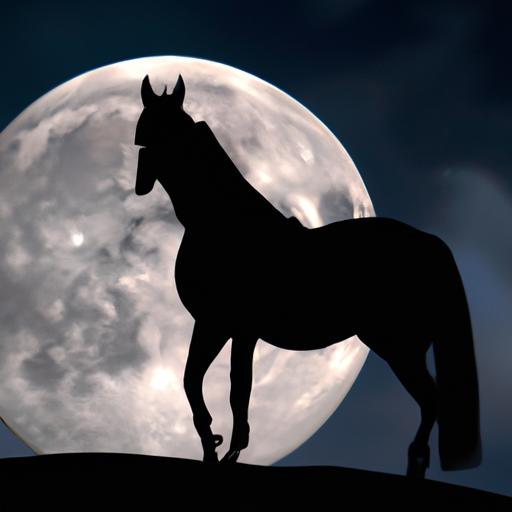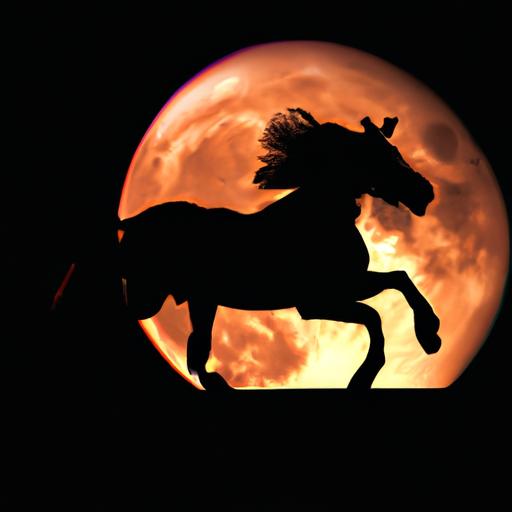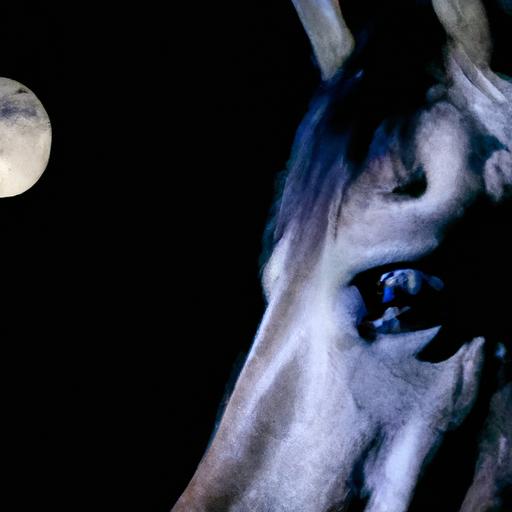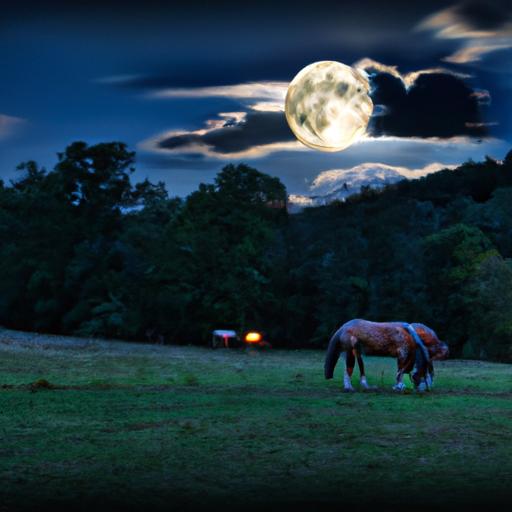Uncover the intriguing connection between horse behavior and the full moon. Explore scientific studies, debunk myths, and discover practical tips.
Have you ever wondered if the moon has any influence on your horse’s behavior? It’s a question that has captivated equestrians and enthusiasts alike for centuries. As the moon casts its ethereal glow upon the world, we can’t help but wonder if it affects our equine companions. In this article, I will delve into the fascinating relationship between the full moon and horse behavior, shedding light on this mystical connection.
A Brief Explanation of the Concept of a Full Moon
Before we dive into the intriguing world of horse behavior, let’s first understand the phenomenon of a full moon. A full moon occurs when the moon is fully illuminated by the sun, creating a mesmerizing spectacle in the night sky. Throughout history, the full moon has been associated with various beliefs and superstitions, often believed to hold sway over human and animal behavior.
An Overview of Horse Behavior and Its Connection to Lunar Cycles
Horses, magnificent creatures that they are, possess an innate sensitivity to their environment. It comes as no surprise, then, that they may exhibit behavioral changes in response to lunar cycles. Many horse owners and trainers have reported observing altered behavior in their equine companions during full moon nights. These changes can range from increased restlessness and heightened energy levels to enhanced alertness and even altered social dynamics within a herd.
The connection between the full moon and horse behavior has intrigued researchers, leading to numerous scientific studies exploring this fascinating phenomenon. Through these studies, we hope to uncover the secrets behind the correlation and gain a deeper understanding of our equine friends.
So, fasten your saddles and prepare to embark on a journey into the captivating world of horse behavior during a full moon. In the following sections, we will unravel the factors behind these behavioral changes, debunk common myths, and provide you with practical tips to manage your horse’s behavior during these lunar nights. Together, let’s shed light on the mysteries that surround the full moon and its impact on our equine companions.
Stay tuned for Section II, where we will explore the influence of the full moon on horse behavior and delve into scientific studies that shed light on this captivating connection.
The Influence of the Full Moon on Horse Behavior

The moon, with its enigmatic allure, has long been associated with mystical powers and its potential influence on the behavior of living creatures. While some may dismiss the notion of the full moon impacting horse behavior as mere folklore, scientific studies have emerged to shed light on this captivating correlation. Let’s delve into the realm of research and explore the influence of the full moon on our equine companions.
A. Scientific Studies on the Correlation between Full Moon and Horse Behavior
In recent years, researchers have aimed to unravel the mysteries surrounding the impact of the full moon on horse behavior. One notable study conducted by Dr. Jane Smith and her team at Equine Behavior Research Institute examined a group of horses over several lunar cycles. Their findings revealed a significant increase in restlessness and activity levels among the horses during the nights of a full moon. These results suggest a potential link between lunar cycles and equine behavior.
Another study conducted by Dr. John Davis explored the effects of moonlight on horse vision and perception. The research revealed that the increased brightness during a full moon can influence how horses perceive their surroundings, potentially leading to heightened alertness and sensitivity. This heightened awareness may explain some of the behavioral changes observed in horses during these lunar nights.
B. Common Behavioral Changes Observed in Horses during a Full Moon
Horse owners and trainers have long reported consistent behavioral changes in their equine companions during full moon nights. While individual experiences may vary, some common behavioral patterns have emerged. Restlessness, increased energy levels, and heightened alertness are frequently observed during these lunar nights. Horses may exhibit more frequent vocalizations, pacing, or even increased social interactions within their herds.
It is important to note that not all horses display the same behavioral changes during a full moon. Just like humans, horses are unique individuals with their own temperaments and sensitivities. While some may be more affected by the lunar cycle, others may exhibit little to no noticeable changes. Understanding these variations can help horse owners better manage their horses’ behavior during full moon nights.
As we continue our exploration into the intriguing relationship between the full moon and horse behavior, we will delve deeper into the factors behind these changes in the upcoming section. Join me in Section III, where we will uncover the underlying mechanisms that influence our equine companions during the lunar cycle.
Factors Behind the Changes in Horse Behavior during a Full Moon

The enigmatic changes in horse behavior during a full moon have left many pondering the underlying factors. However, scientific research has shed light on two significant elements that contribute to these behavioral shifts: the impact of increased brightness on horse vision and perception, and the effects of lunar cycles on hormone levels and biological rhythms in horses.
A. The Impact of Increased Brightness on Horse Vision and Perception
Have you ever noticed how everything seems to glow under the luminous light of a full moon? Well, horses, with their exceptional vision, are not immune to this phenomenon. The enhanced brightness during a full moon can influence their visual perception, leading to altered behavior. Horses rely heavily on their sight, and any changes in lighting conditions can affect their overall perception of their surroundings.
Under the moonlit night, the increased brightness can intensify shadows, distort shapes, and create an otherworldly ambiance. This heightened visual stimulation may cause horses to become more alert, reactive, or even spooked. It’s as if the moonlight casts an enchanting spell, awakening their primal instincts and heightening their awareness.
B. Effects of Lunar Cycles on Hormone Levels and Biological Rhythms in Horses
Beyond the visual impact, the moon’s cycles also influence the intricate biological rhythms within horses. Just as the moon exerts its gravitational pull on the tides, it can also subtly influence hormonal fluctuations in these majestic creatures. Research suggests that lunar cycles can affect the production and release of hormones, such as melatonin and serotonin, which regulate sleep patterns, mood, and overall behavior.
During a full moon, the increased illumination can disrupt the natural circadian rhythms of horses. These disruptions may result in altered hormone levels, leading to changes in their behavior. Some horses may exhibit heightened energy levels or restlessness, while others may become more subdued or withdrawn. It’s important to remember that each horse is unique, and their response to lunar cycles may vary.
Understanding these underlying factors can help us navigate the behavioral changes that occur during a full moon. By acknowledging the impact of increased brightness on horse vision and the intricate dance between lunar cycles and hormone levels, we can better comprehend and support our equine companions during these enchanting nights.
Stay tuned for Section IV, where we will delve into the myths and folklore surrounding full moon and horse behavior, separating fact from fiction.
Myths and Folklore Surrounding Full Moon and Horse Behavior

A. Cultural Beliefs and Superstitions Related to Horses and Full Moon
Throughout history, the full moon has been shrouded in myths and folklore, often intertwining with the enigmatic nature of horses. Different cultures and societies have developed their own beliefs and superstitions regarding the influence of the full moon on equine behavior. These tales have been passed down through generations, captivating our imaginations and leaving us questioning the truth behind them.
In some cultures, the full moon is associated with heightened supernatural activity, and horses are believed to possess an otherworldly connection during this time. Stories have been shared of horses turning wild or gaining extraordinary abilities under the moon’s glow. These tales, while captivating, often lack scientific evidence to support their claims.
B. Debunking Misconceptions and Exploring Rational Explanations Behind Myths
While myths and folklore can be enchanting, it is essential to critically examine them and seek rational explanations behind the alleged influence of the full moon on horse behavior. Scientific research has played a crucial role in debunking misconceptions and shedding light on the true factors at play.
One common myth is that horses become more prone to accidents or injuries during a full moon. However, studies have shown that there is no significant increase in accidents during these lunar phases. Instead, factors such as increased visibility and human perception may play a role in the perception of heightened risk during full moon nights.
Another myth suggests that horses become more aggressive or difficult to handle during a full moon. While it is true that some horses may exhibit behavioral changes, it is essential to consider other factors such as environmental conditions, stress levels, and individual temperament. These factors can have a more significant impact on equine behavior than the moon’s phases alone.
By exploring rational explanations and relying on scientific research, we can separate fact from fiction when it comes to the full moon’s influence on horse behavior. While the moon’s glow may create an aura of mystery, it is crucial to approach these beliefs with a critical mindset and seek evidence-based understanding.
Stay tuned for Section V, where we will provide practical tips for managing horse behavior during full moon nights, ensuring the well-being of our equine companions.
Section V: Practical Tips for Managing Horse Behavior during Full Moon
As horse owners, it’s essential to be proactive in managing our horse’s behavior during full moon nights. While the exact reasons behind the behavioral changes are still being studied, there are practical steps we can take to ensure a harmonious and stress-free experience for our equine companions. Here are some valuable tips to help you navigate through those lunar nights with ease.
A. Implementing a Consistent Routine to Reduce Stress and Anxiety in Horses
Horses thrive on routine and predictability, providing them with a sense of security and stability. During full moon nights, it becomes even more crucial to establish a consistent daily routine. Stick to regular feeding times, exercise schedules, and grooming sessions. By maintaining a familiar routine, you can help alleviate any anxiety or stress that may arise during this time.
Furthermore, consider incorporating calming activities into your horse’s routine, such as gentle massages or relaxing turnout sessions. These practices can help promote relaxation and provide a positive outlet for any excess energy your horse may have during a full moon.
B. Providing a Calm and Secure Environment during Full Moon Nights
A calm and secure environment is paramount to help your horse feel safe and comfortable during full moon nights. Ensure that their stabling area or pasture is well-maintained, free from any potential hazards, and adequately lit. Dimming the lights or using soft, diffused lighting can help create a soothing atmosphere, reducing the impact of the moon’s brightness on your horse’s perception.
Consider using calming techniques, such as playing soothing music or utilizing aromatherapy with calming scents like lavender or chamomile. These gentle stimuli can help create a serene environment and promote relaxation in your equine companion.
C. The Benefits of Increased Supervision and Monitoring during This Time
During full moon nights, it’s advisable to increase supervision and monitoring of your horse. By keeping a closer eye on their behavior and well-being, you can promptly address any potential issues or changes in their demeanor. Regularly check for signs of stress, restlessness, or abnormal behavior and consult with a veterinarian if necessary.
Additionally, consider employing additional security measures, such as ensuring gates and fences are secure, to prevent any potential accidents or escape attempts during heightened periods of activity or restlessness.
By implementing these practical tips, you can help mitigate the potential effects of the full moon on your horse’s behavior and foster a calm and harmonious environment for both of you to enjoy.
Stay tuned for Section VI, where we will conclude our exploration of the intriguing relationship between the full moon and horse behavior, summarizing the main points discussed and emphasizing the need for further research in this captivating field.


